
🚨Excited to announce the full-day Moral Psychology pre-conference at #SPSP2026!
We sold out last year, and with this year’s incredible speaker lineup, we expect the same.
Submit your poster or data blitz abstract by Oct. 23! spsp.wufoo.com/forms/2026-p... There’s a best poster award!
07.10.2025 16:36 — 👍 30 🔁 11 💬 1 📌 3
Will be sure to share the results as they become available!
15.09.2025 19:16 — 👍 1 🔁 0 💬 0 📌 0

In the Battle for Congress, Working-Class Democrats Try a Hardscrabble Pitch
Very astute piece by @anniekarni.bsky.social on how Democrats are embracing working-class candidates.
My research lab has multiple ongoing projects on this very idea, so stay tuned for some empirical data coming soon!
www.nytimes.com/2025/09/07/u...
www.nytimes.com/2025/09/07/u...
15.09.2025 18:39 — 👍 3 🔁 0 💬 1 📌 0

The paper is now out, and you can read it here: authors.elsevier.com/a/1lhYz51f8w...
This is joint work with Zak Tormala and Christian Wheeler at Stanford.
01.09.2025 14:34 — 👍 6 🔁 0 💬 0 📌 0
We see the DV of choice of extreme candidates as an understudied one in psychology. I hope we see more research on it.
We also think that studying how people assess whether a candidate is extreme or moderate would be an exciting future direction.
01.09.2025 14:34 — 👍 3 🔁 0 💬 1 📌 0
This effect was robust to …
different descriptions of extreme candidates
👉different issues
👉controlling for other attitude dimensions (e.g., certainty, importance, moralization, knowledge).
👉Different methods (e.g., conjoint, vignettes, human-LLM interactions)
01.09.2025 14:34 — 👍 1 🔁 0 💬 1 📌 0
Is this just about group identity? Unlikely.
In another study, we used LLMs. They either prompted Ps to reflect on their views, or to connect those views to their identity.
When views were tied to identity, attitudes grew more extreme and so did support for extreme candidates.
01.09.2025 14:34 — 👍 1 🔁 0 💬 1 📌 0
The effect held even on issues people knew nothing about.
Saying John has a view on abortion doesn’t tell you if he’s pro-life or -choice.
So we made up an issue (“Prop DW”). Party had/no stance. That alone made it feel identity-relevant, pushing ppl to more extreme candidates.
01.09.2025 14:34 — 👍 2 🔁 0 💬 1 📌 0
In a Conjoint study, we had people choose between different candidates (different ages, backgrounds, views on social issues).
We measured people’s identity relevance.
As identity relevance increased, people became more likely to choose the candidate who is extreme.
01.09.2025 14:34 — 👍 2 🔁 0 💬 1 📌 0

Across six studies, we find that as people’s opinions on political issues become more part of their identity, they are drawn to extreme (vs. moderate) candidates.
01.09.2025 14:34 — 👍 3 🔁 0 💬 1 📌 0
What is identity relevance?
It’s the degree to which your view on an issue feels like a reflection of who you are.
For some, views on climate change are core to identity.
For others, they may have strong views, but those views don’t define them.
01.09.2025 14:34 — 👍 2 🔁 0 💬 2 📌 0
Past work has focused on structural factors (e.g., primary elections, changes in supply of candidates).
In a new paper, we shift the conversation to *psychological* factors.
We test if the *identity relevance* of people’s attitudes cause them to choose extreme candidates.
01.09.2025 14:34 — 👍 2 🔁 0 💬 1 📌 0
🚨New Paper🚨
Elected officials are increasingly extreme.
E.g., a recent analysis of 84,000 state-level candidates found that extreme candidates are now winning at the highest rates in 30 years.
Why are people increasingly drawn to extreme candidates?
01.09.2025 14:34 — 👍 33 🔁 8 💬 7 📌 1
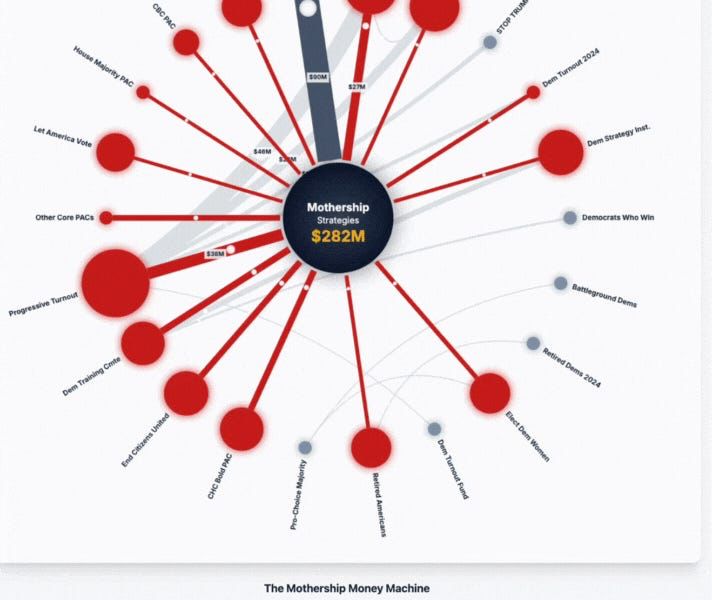
The Mothership Vortex: An Investigation Into the Firm at the Heart of the Democratic Spam Machine
How a single consulting firm extracted $282 million from a network of spam PACs while delivering just $11 million to actual campaigns.
The annoying spam texts destroying the Democratic brand:
$678M raised through those spam tactics
$282M to one consulting firm: Mothership Strategies.
$11M to actual campaigns (1.6%)
The party isn’t just treating donors like marks—it’s being fleeced itself yet continues to back Mothership.
03.08.2025 17:02 — 👍 7858 🔁 3025 💬 395 📌 668
🚨Free data alert!! 🚨 Please share.
Large new dataset of Amazon product reviews, including full text and photos and product characteristics, with individual *reviews labeled as fake reviews*.
I believe this is the first publicly available data of this kind.
github.com/bretthollenb...
11.07.2025 21:17 — 👍 127 🔁 42 💬 1 📌 2
A big obstacle of studying fake reviews is that the ground truth is missing. Which review is fake and which is organic?
Brett and coauthors provide a dataset that contains the ground truth for individual reviews using a novel method developed over several papers. A really valuable resource!
12.07.2025 08:47 — 👍 5 🔁 1 💬 0 📌 0
I am looking to recruit a postdoc to join my lab next fall, & work on 2 projects focused on online mobilization with social media datasets. If anyone knows of someone with computational skills (network analysis, NLP, etc.) who is looking for a postdoc- have them reach out to me.
16.04.2025 16:15 — 👍 8 🔁 9 💬 1 📌 1
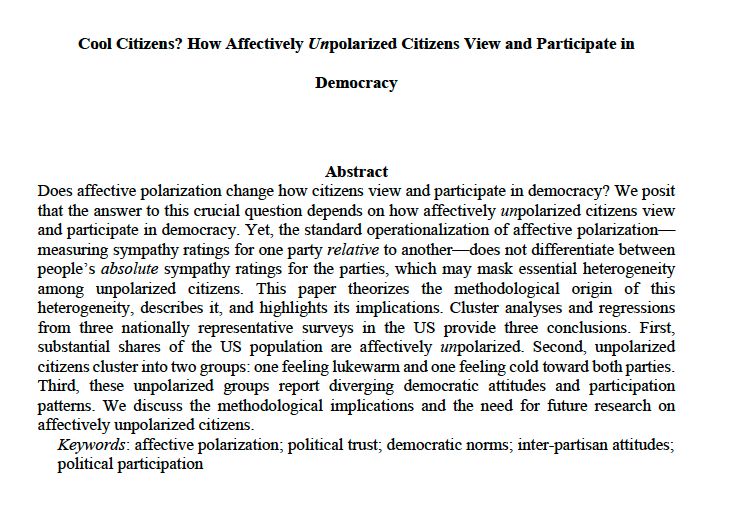
🚨Preprint alert🚨
How does affective polarization change democracy? Lots of pubs study how AP affects trust, democratic norms, inter-partisan attitudes, and participation.
We (w/ @polpsychjoe.bsky.social, @lilymasonphd.bsky.social) examine a vital assumption this research seems to rely on:
1/6🧵
24.06.2025 13:43 — 👍 53 🔁 24 💬 2 📌 2
What a great read. Thanks for sharing!
24.06.2025 14:24 — 👍 0 🔁 0 💬 0 📌 0

The Dangers of AI Personalization
If AI can master what we call “deep tailoring,” it can begin to slip unnoticed into our online worlds.
In TIME today, Jake Teeny and I share our take on AI-driven persuasion that uses your personal data to craft messages built just for you.
time.com/7296719/ai-p...
24.06.2025 14:05 — 👍 8 🔁 2 💬 2 📌 1
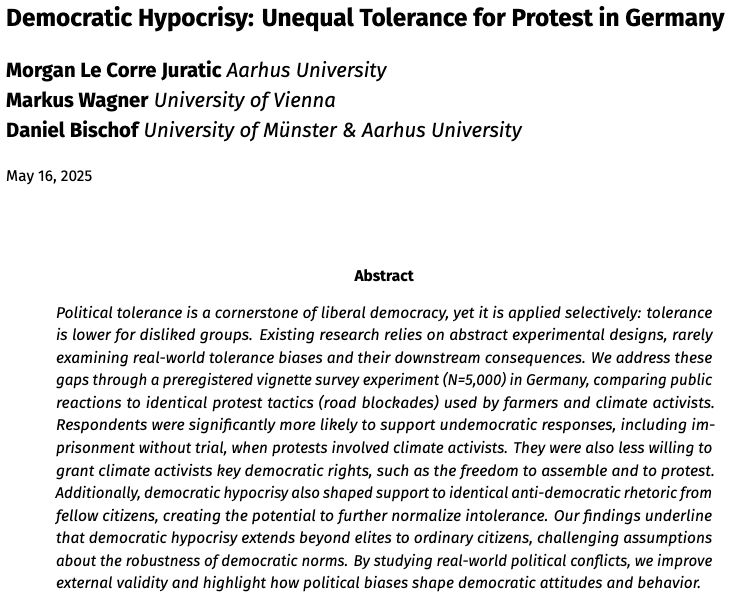
🚨 working paper (w. @morganlcj.bsky.social @markuswagner.bsky.social): Protesters are not judged equally - even if tactics of groups are similar.
We ran an experiment in 🇩🇪 testing how people react to farmers vs. climate activists blocking roads.
What we find is disturbing:
osf.io/preprints/os...
16.05.2025 12:59 — 👍 361 🔁 147 💬 10 📌 23
AsCollected - Coming Soon
At the CredibilityLab (currently hosting Aspredicted and Researchbox) we have a new platform in the works, AsCollected, that will help with this. We welcome input from experienced parties.
Signup for alpha or beta testing or announcement of release at AsCollected.Org
20.05.2025 01:11 — 👍 12 🔁 3 💬 0 📌 0
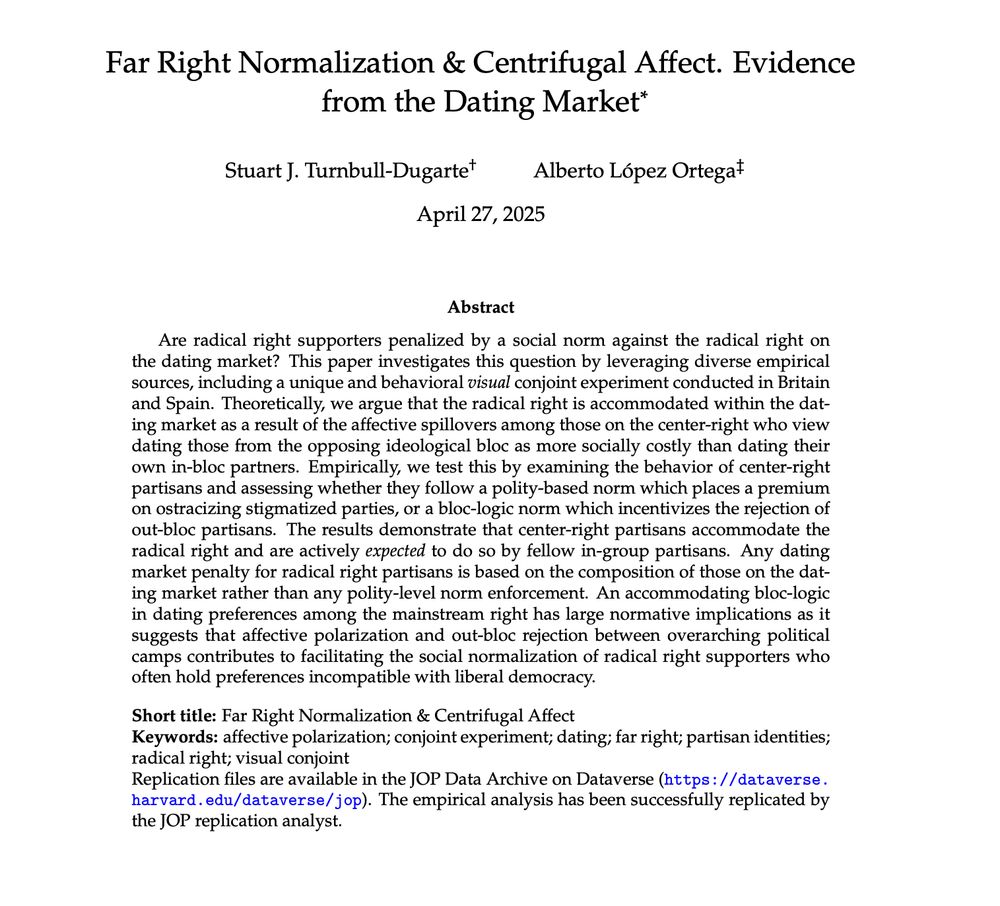
A Tinder Test of Democratic Norms💋
New paper in @thejop.bsky.social with @bertous.bsky.social
We rely on a visual conjoint experiment, cross-sectional data, & panel data to show that affective polarization drives the normalisation of the far right among the centre-right 🇬🇧🇪🇸
doi.org/10.1086/736698
19.05.2025 08:09 — 👍 284 🔁 120 💬 9 📌 26
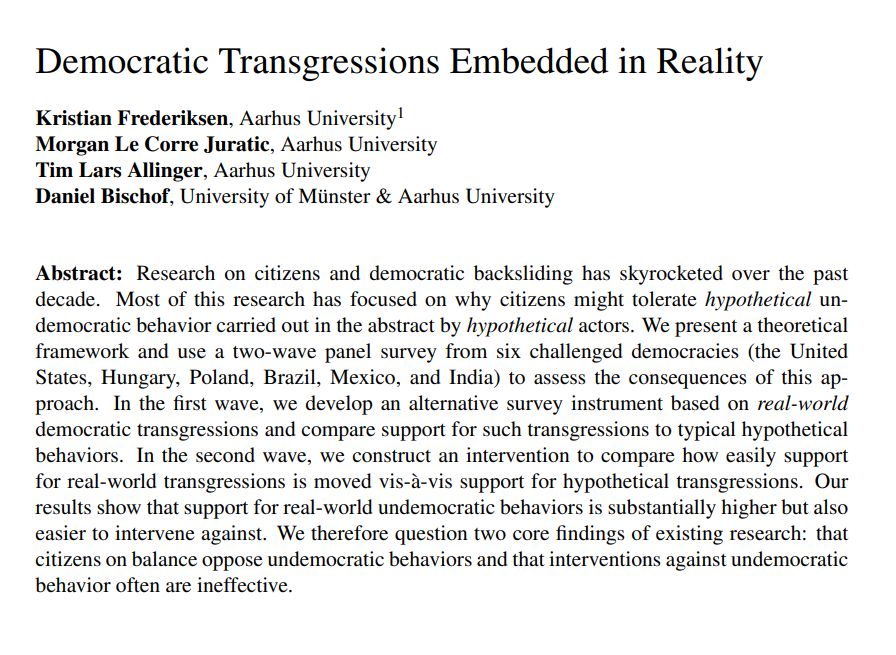
🛎️New WP with @morganlcj.bsky.social @timallinger.bsky.social and @danbischof.bsky.social
Against the surge of conjoints and other hypothetical experiments in relation to democratic backsliding, we study the consequences of using hypotheticals versus real-world scenarios.
osf.io/preprints/os...
14.05.2025 10:06 — 👍 53 🔁 19 💬 1 📌 2

Ep 107! @mhusseinlab.bsky.social shares his research on the cues that signal open-mindedness and whether people like it when others listen to opposing political views.
Apple: podcasts.apple.com/us/podcast/1...
Spotify: open.spotify.com/episode/0B6L...
Web: opinionsciencepodcast.com/episode/rece...
06.05.2025 15:39 — 👍 10 🔁 2 💬 0 📌 0
A new and fresh paper calls for a fresh start on a new platform. Hi y'all! 👋
Check out my paper with @spillersas.bsky.social and @krajbichlab.bsky.social - we look at the multi-faceted role of attention in opportunity cost neglect, using eye-tracking + computational modeling. Read more at the link!
22.04.2025 21:39 — 👍 15 🔁 4 💬 0 📌 0
Postdoctoral Fellow in Psychology
Dr. Ashwini Ashokkumar’s lab at the Department of Psychology at Harvard University invites applications for a Postdoctoral Fellow position to start in Fall 2025. The lab conducts research related to i...
🚨🚨 I’m looking for a postdoctoral fellow to join my lab at Harvard's Psychology Department starting Fall 2025 🚨📣
Please share widely and spread the word to interested candidates! 🧵
🗓 Application review begins April 30
Apply here: rb.gy/k7q9kf (1/2)
22.04.2025 23:56 — 👍 55 🔁 46 💬 1 📌 2
In a quasi-experimental survey with 59,508 participants across 63 countries, we tested 11 behavioral interventions designed to promote climate change mitigation. Our goal was to understand which interventions were most effective at encouraging climate-friendly behaviors—on a country-by-country basis
28.02.2025 18:52 — 👍 1 🔁 1 💬 3 📌 0
Excited to see this in print! It speaks to a number of social science literatures—protest effectiveness, repression, propaganda, stereotypes & morality, gender & politics, and disparate treatment between & within identity categories.
06.02.2025 15:00 — 👍 21 🔁 8 💬 1 📌 0
PhD student at Harvard interested in intergroup conflict and political psychology
isaiasghezae.github.io
Congressional correspondent, New York Times, co-author of the NYT bestseller “Mad House,” out 3/25/25
Social psychologist studying inequality and its implications for organizations, law, and politics
Studying political psychology, emotions and identities.
Postdoc at PARTISAN, University of Vienna.
Formerly Hotpolitics Lab, University of Amsterdam.
PhD Candidate at UCSD Rady | First Generation | Interested in Moral Disagreement, Punishment, and Political Polarization
https://sites.google.com/view/raihan-alam/home
Assistant Professor in Political Science & Data Science at Trinity College Dublin, Director of the Applied Social Data Science (ASDS) Programme.
Former Post-Doc at QTM Emory, WUSTL PhD. UW-Madison alum & native.
www.jeffreyziegler.org
Assistant professor of Government @ Harvard. Studies identity, race, and immigration. https://www.marcelroman.com/
UVA ‘21 | Political Psychology PhD candidate at Stony Brook | they/them🏳️🌈🏳️⚧️ | opinions are their own
PhD candidate in political science at the EUI [On the 25/26 job market].
Currently visiting Harvard's Department of Government.
Interested in: political behavior, quantitative methods, metascience.
https://www.jorisfrese.com/
PhD student at the Department of Political Science at Stockholm University.
website: https://joenoonan.se/
Associate Prof. of Behavioral Science and Director of the IBT @HSGStGallen
#mobilesensing, #dailybehavior, #personality, #machinelearning, #explainableAI
Ai + Persuasion researcher | https://lukehewitt.info
data science + political communication @oiioxford @uniofoxford
Associate professor at UCLA Anderson, works on IO, marketing etc. Temporary Parisian.
bretthollenbeck.com
Postdoc in the Behavioral Decision Making area at UCLA Anderson. I study ethical decision making and social norms.
Professor of Social Psychology, University of Southern California. Interested in Computational modeling of personality, decision-making, social reasoning, and social behavior. Also interested in relating this to Neuroscience
danbischof.com
Political Scientist: studying democracy with experiments & data
Professor | University of Münster
Associate Professor | Aarhus University
(he/him | "Sie" als Anrede brauche ich nicht)
Assistant Professor of Marketing @ Chicago Booth.
Researching how and why we choose what we choose. Sometimes it makes sense.
Assistant Prof at Columbia || Studying data science and its interactions with human behavior || Applications in education, healthcare, and online platforms.
https://hannahql.github.io/













